Even if Zdeno Chara’s retirement tour isn’t already underway, the Boston Bruins’ succession plan for their captain most definitely is. The defenseman’s career is well into its twilight, judging solely by his NHL-high 42 years of age. That’s saying nothing of Chara’s decreased performance and, subsequently, usage by the Bruins.
The 2019-20 season represents the second straight campaign Chara has taken a one-year deal. So, everyone involved at least acknowledges at this point any given campaign can be his last. What if this one was, though? Thankfully, the Bruins remain contenders even as Chara, once the league’s most valued defenseman, has been relegated to a supporting role on the blue line.
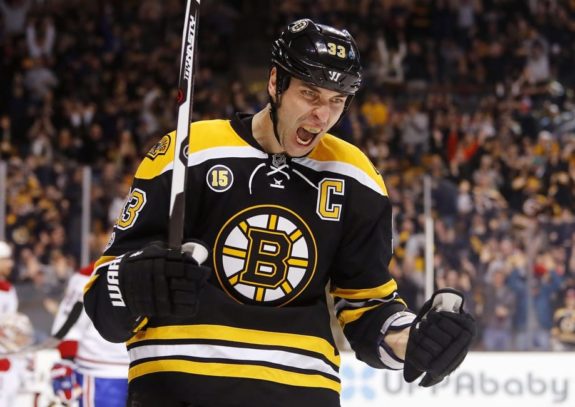
The Bruins will clearly be all right once Chara decides the time is right to call it a (Hall of Fame) career. This succession plan is proof. You can’t spell succession without success, after all.
Chara as the Bruins’ Top Shutdown Defenseman
Over the years, Chara has developed a well-earned reputation as one of the league’s top shutdown defensemen. His massive size, at 6-foot-9, and reach have helped in that regard. However, for a guy who was once considered a throw-in as part of the Alexei Yashin deal because of his one-dimensional nature, Chara routinely battled against the top competition the league had to offer (with incredible success).
Even as recently as these past 2019 playoffs, Chara technically ranked first among Bruins defensemen in terms of time-on-ice quality of competition (average ice time of on-ice opponents). Granted, he also ranked fifth in terms of Corsi (shot-attempt differential), which is further proof of his decline.
Nevertheless, Chara remains a workhorse, especially on the penalty kill. Looking only at active Bruins defensemen, Chara owns the top average time shorthanded (per game) for 11 of the 13 seasons he’s played with the Bruins (excluding 2019-20). Those 11 times include last season, when he led the team, playing 3:03 shorthanded per game, so he’s still being put to work.
Of course, his effectiveness is to be debated, with the Bruins’ having iced a mediocre penalty-kill unit (79.9%). Brandon Carlo was second on the team (2:47) in terms of shorthanded ice time and even usurped Chara during the playoffs (3:12 compared to 2:52). Of note, the Bruins ranked third during those playoffs with an 88.4% success rate, however small a sample size it represents.
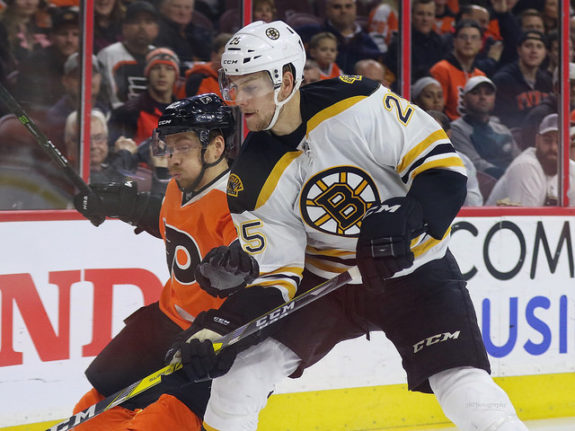
Carlo has long been considered a top shutdown defensive prospect and is coming into his own in that regard. Leading all Bruins over the past three seasons with a plus-41 rating, the 23-year-old 6-foot-5 defenseman represents the most logical player to replace Chara as the Bruins’ preeminent shutdown option on the back-end (if he hasn’t already).
Chara as Power-Play Quarterback
Carlo was one of two top bargain re-signings on the back-end this past summer. Charlie McAvoy was the other, as he inked a three-year, $14.7 million deal.
In truth, it’s actually been some time since Chara was the team’s top offensive threat on the blue line. It’s a role he filled from the time he signed on with the Bruins for the 2006-07 season until 2013-14, an impressively lengthy eight-year span during which he averaged 47 points per 82 games.
Following a brief detour to (Dougie) Hamilton, the torch was eventually passed on to Torey Krug, who actually led the Bruins in power-play points in 2013-14. Krug has led all Bruins defensemen in scoring for the last four seasons, averaging 56 points per 82-games. However, as a pending unrestricted free agent, Krug’s future with the team past the 2019-20 season is in doubt, just like Chara’s.
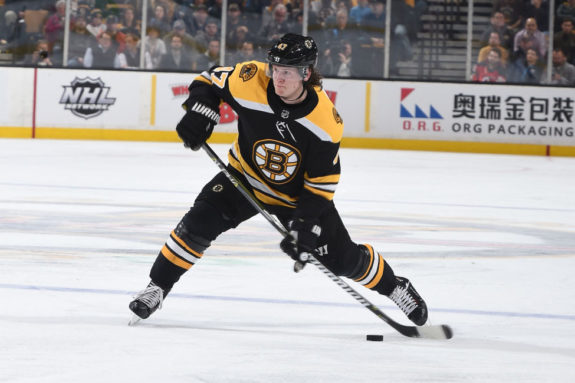
Krug obviously remains a big part of the Bruins’ back-end, and, at just 28 years of age, he can stay that way for a long while. For some context, Chara was 37 by the time his production started to dip.
Of course, as Chara has proven over the course of his career, he’s unique and not necessarily an accurate measuring stick for everyone else. Chara’s unprecedented value to the Bruins over such an extended period of time is in large part why he’s earned the right to end his tenure with the Bruins on his terms whenever he’s ready.
Depending on who you ask, the same cannot necessarily be said for Krug. His play in his own zone has left something to be desired over the years. He’s still a commodity, but for a Bruins team up against the cap, that doesn’t have any big contracts coming off the books this coming summer and will have to re-sign the likes of Jake DeBrusk and Matt Grzelcyk? Krug may end up being a luxury they can’t afford.
Thankfully, the Bruins’ blue line is in decent shape moving forward, regardless. The uncertainty regarding Krug is why McAvoy’s recent deal, after which he’ll still be a restricted free agent, is so important. The 21-year-old McAvoy may have durability issues, having yet to reach 70 games in a single season, but his offensive prowess with the puck is undeniable.
McAvoy has admittedly had his ice time on the power play dwarfed by Krug since the 2016 first-round pick made his debut two seasons ago. Nevertheless, McAvoy averaged the second-most among defensemen in each of those campaigns. Furthermore, he averaged more overall ice time in 2018-19 (22:10 to 21:18), the most on the entire team in fact.
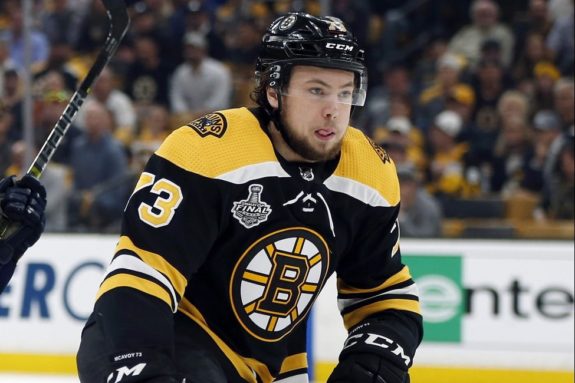
It goes to show McAvoy’s value as a better all-around defenseman, akin to Chara. Of course, considering how Chara is still around after his role as the team’s power-play quarterback has been filled by Hamilton and then Krug and maybe now by McAvoy, it’s clear that once he does retire he’ll likely have to be replaced more by committee than any one player. His true value arguably supersedes simple metrics like ice time and points, though. He’s the captain for crying out loud.
Chara as Captain
There’s really only clear choice as captain, once Chara retires: Patrice Bergeron. He’s one of three alternate captains, but the longest-serving Bruin of the bunch (David Backes, David Krejci). He’s even played for the Bruins longer than Chara has, making his debut in 2003 as a just-drafted 18-year-old. Combine those factors with his elite two-way play, which allows him to lead by example at both ends of the ice, and there’s just no one else who qualifies to take over for Chara.
Some have even argued the perennial Selke Trophy favorite should have been named captain for this season. That may be pushing it seeing as Chara has done nothing to be stripped of the captaincy but lead the Bruins to a playoff berth in each of the seasons he’s played into his forties.
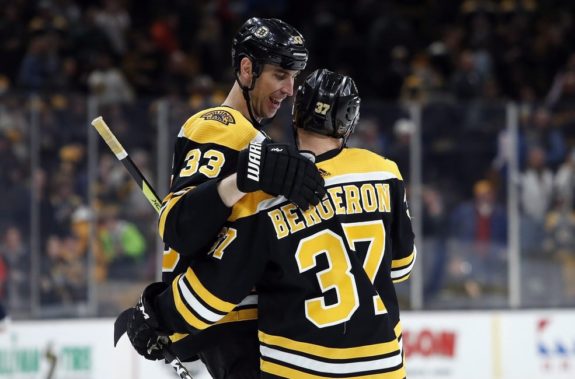
In fact, the Bruins have gone further in each of the last three seasons, a stretch that culminated in a heartbreaking seven-game Stanley Cup Final loss. Of course, let’s stop short of arguing Chara has gotten better with age. He hasn’t. He’s lost a few steps over the last few seasons, which is a clear indication that leadership has little to do with playing ability. You don’t need to be a superstar to be captain.
Granted, the captaincy is also a largely symbolic concept that has little tangible worth to a hockey club. However, that would just prove the right person is at the helm now. There’s no point holding a changing of the guard when all it would serve to do is diminish Chara’s contributions to the Bruins, of which there have been too many to count.
The same goes for Bergeron, who, had he been drafted by any other team, likely would have had the honor of wearing a “C” by now. Still, that shouldn’t be a reason to give it to him now. The Bruins aren’t in any way weaker with Bergeron wearing an “A” instead. It’s a testament to the amount of leadership they have in the dressing room right now, that a player of Bergeron’s caliber on and off the ice is just an alternate. What shouldn’t be forgotten, though, is it’s also a testament to Chara’s individual worth to the team as captain too.
You may be able to picture Bergeron as captain, but can you really picture the Bruins without Chara? Eventually, fans will have to, but the Bruins will thankfully be able to cross that bridge when they come to it. There’s no need to rush it, though.